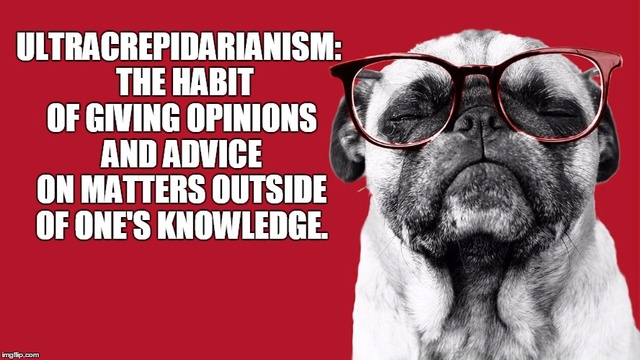Ultracrepidarianism - and wishful thinking
There is nothing wrong with having a poor or superficial understanding of a subject. The problem is when someone is not able to recognize its own condition, and understands that its own understanding on subject X is poor, superficial, or even false, and thinks, nonetheless, is able to make valid inferences of complex deeper issues, without recognizing, that his knowledge is not sufficient, or inadequate to come to conclusions with a high probability to be correct. Or many chose what they want to believe in regard to origins, and use inadequate and superficial knowledge to back up their views and fool themselves. Life is complex. Biology is complex in its very essence. To understand what really happens and is going on on a molecular level, much study, knowledge, and understanding are required. Which most people do not have. Scientists dedicate their whole life on specific issues, and the more they advance, the more they recognize how little they know.
Nonetheless, many see themselves in a sufficiently authoritative position, to judge someone else's position which differs with theirs. They often do it based on fallacies like
authority. They think because scientist X holds that position and Y peer-reviewed papers exist, or there is a consensus in scientific circles in regard to a subject, their view is sufficiently backed up, and must be true. Others say, because Z has been claimed to be false by the majority, it must be false, and to adhere to the position held by the majority, grants enough authority and security of being correct.
Others base their security on their own credentials, and believe, because they obtained a degree somewhere, they must hold the more case-adequate views. They only dismiss or do not consider the fact, that like-minded people eventually gave them their degree, and might be wrong, too. Or that their information might be outdated. And are unwilling to recycle or renew their education.
Others ask if the other side of the debate has a degree and if it has not, think their views can be dismissed. Having a degree does not mean that someone is right. And not having one, does not mean that that person has not sufficient knowledge to adequately make logical, case-correct inferences. The internet today gives access to information as never before so anyone can get a consistent knowledge about almost anything that is known, out there.
The only way to gain true knowledge is if you do your own homework. Spend time to actually understand, what you argue about, then you can discuss the subject, and not, what Y, X, or Z say about it.

There is nothing wrong with having a poor or superficial understanding of a subject. The problem is when someone is not able to recognize its own condition, and understands that its own understanding on subject X is poor, superficial, or even false, and thinks, nonetheless, is able to make valid inferences of complex deeper issues, without recognizing, that his knowledge is not sufficient, or inadequate to come to conclusions with a high probability to be correct. Or many chose what they want to believe in regard to origins, and use inadequate and superficial knowledge to back up their views and fool themselves. Life is complex. Biology is complex in its very essence. To understand what really happens and is going on on a molecular level, much study, knowledge, and understanding are required. Which most people do not have. Scientists dedicate their whole life on specific issues, and the more they advance, the more they recognize how little they know.
Nonetheless, many see themselves in a sufficiently authoritative position, to judge someone else's position which differs with theirs. They often do it based on fallacies like
authority. They think because scientist X holds that position and Y peer-reviewed papers exist, or there is a consensus in scientific circles in regard to a subject, their view is sufficiently backed up, and must be true. Others say, because Z has been claimed to be false by the majority, it must be false, and to adhere to the position held by the majority, grants enough authority and security of being correct.
Others base their security on their own credentials, and believe, because they obtained a degree somewhere, they must hold the more case-adequate views. They only dismiss or do not consider the fact, that like-minded people eventually gave them their degree, and might be wrong, too. Or that their information might be outdated. And are unwilling to recycle or renew their education.
Others ask if the other side of the debate has a degree and if it has not, think their views can be dismissed. Having a degree does not mean that someone is right. And not having one, does not mean that that person has not sufficient knowledge to adequately make logical, case-correct inferences. The internet today gives access to information as never before so anyone can get a consistent knowledge about almost anything that is known, out there.
The only way to gain true knowledge is if you do your own homework. Spend time to actually understand, what you argue about, then you can discuss the subject, and not, what Y, X, or Z say about it.


